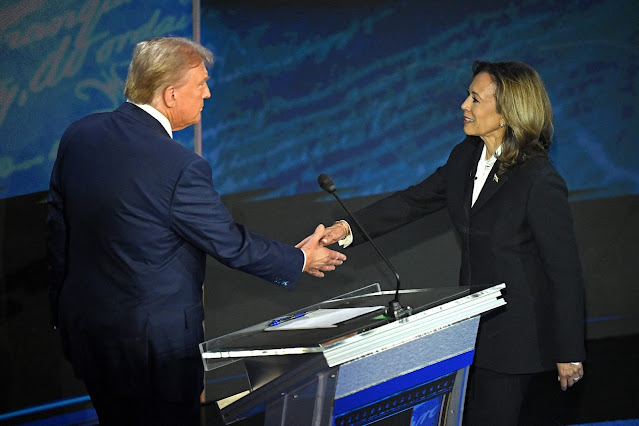Harris Challenges Trump in First Presidential Debate
In a highly anticipated debate held in Philadelphia, Vice President Kamala Harris presented a vigorous case against former President Donald Trump, emphasizing their sharply contrasting visions for the future of the United States. This debate, which may be the only one before the upcoming presidential election, focused on critical issues such as abortion rights, immigration policies, and the state of American democracy.
A Bold Approach
Harris did not shy away from confronting Trump directly. She repeatedly reminded him of his denial regarding the 2020 election results, where he lost to President Joe Biden. Throughout the debate, she delivered pointed remarks aimed at highlighting Trump's false claims and his pivotal role in the Supreme Court's decision to overturn the national right to abortion two years ago. This move was designed to underscore the stakes for voters who value reproductive rights.
In response, Trump labeled Harris as overly liberal and a continuation of Biden's administration, which he argued is unpopular among the electorate. His strategy involved personal attacks and digressions, a tactic that his advisers had previously advised him to avoid. This approach, however, seemed to backfire as Harris's focused and assertive demeanor kept the spotlight on the issues at hand.
The Stakes of the Election
With less than two months until Election Day and early ballots set to be mailed soon, the debate provided a critical glimpse into a race that has been tumultuous and unpredictable. Harris's performance was markedly different from Biden's earlier debate in June, where he appeared muddled and uncertain. In contrast, Harris utilized her body language and facial expressions to convey disbelief and amusement at Trump's responses, effectively engaging the audience.
Harris aimed to position herself as a refreshing alternative for voters seeking a break from Trump's contentious style of politics. She made a notable remark about speaking with foreign leaders who, according to her, "are laughing at Donald Trump," and she cited military leaders who described him as a "disgrace." This tactic of using personal anecdotes was intended to resonate with voters concerned about America's standing on the global stage.
Addressing Key Issues
One of the central themes of the debate was abortion rights. Harris passionately articulated the impact of the Supreme Court's ruling on Roe v. Wade, which she attributed to Trump's appointment of three justices who supported the decision to overturn the landmark ruling. She painted a vivid picture of the challenges women face in accessing abortion care, asserting that Trump would impose a national abortion ban if he returned to office.
Trump, on the other hand, dismissed Harris's claims as "lies," asserting that he would not sign a national ban and preferred to leave the issue to the states. This exchange highlighted the stark differences in their approaches to reproductive rights, a topic that is likely to be pivotal in the upcoming election.
In addition to abortion, the candidates debated economic policies. Harris promised tax cuts aimed at the middle class, while Trump focused on his proposed tariffs as a means to address trade imbalances. He also attempted to shift the conversation to immigration, a cornerstone of his campaign, accusing Democrats of facilitating illegal crossings while Harris countered that recent asylum restrictions had led to a decrease in border crossings.
Confronting Racial and Gender Stereotypes
Throughout the debate, Trump attempted to undermine Harris by questioning her racial identity, a tactic that has been a recurring theme in his rhetoric. Harris responded firmly, stating, "I think it’s a tragedy that we have someone who wants to be president who has consistently over the course of his career attempted to use race to divide the American people." This exchange highlighted the ongoing issues of race and gender in American politics.
As the debate concluded, both candidates expressed openness to future discussions, with Harris's campaign hinting at the possibility of another meeting in October. The debate not only set the stage for the upcoming election but also illustrated the deep divisions within American society. With key issues like abortion, immigration, and democracy at the forefront, voters will have to make critical decisions about the direction they want the country to take.
As the nation approaches Election Day, the contrast between Harris and Trump could not be clearer, and the stakes have never been higher. The debate served as a reminder of the importance of civic engagement and the power of informed voting in shaping the future of the United States.
News Agencies

